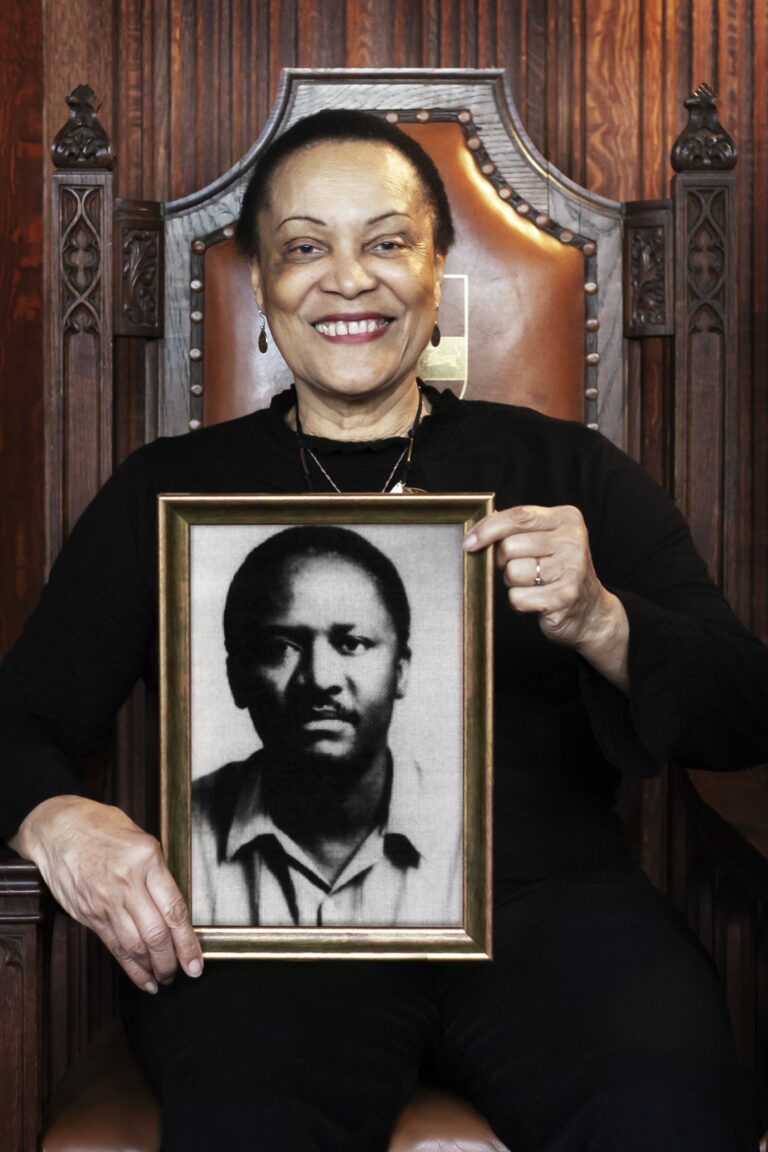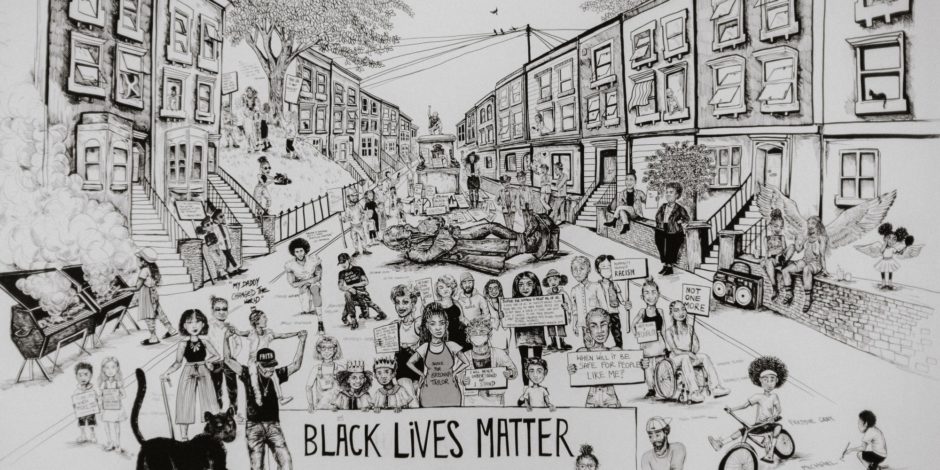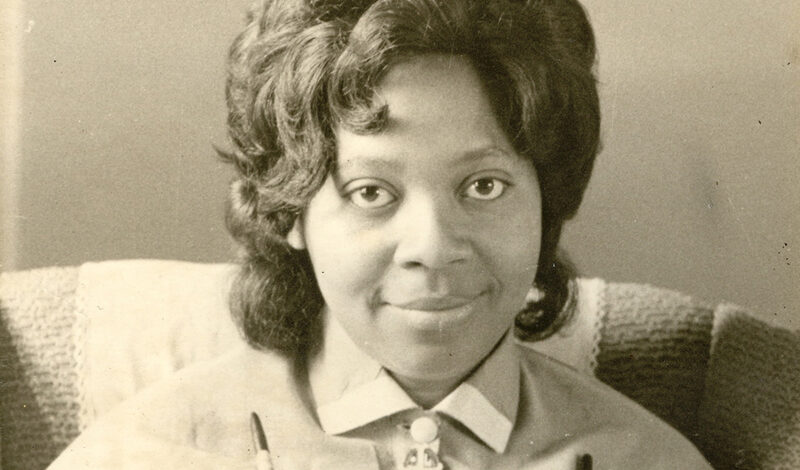Okot p’Bitek challenged the distorted way in which Western scholars had viewed Africa. He was a poet, an athlete and a pioneer of decolonisation. And he studied right here in Bristol. Antonette tells us why he matters.
One of my favourite pastimes, since age seven, is composing and performing poetry. I was born and bred in Barbados, a Caribbean Island, where I had a sound British education, so my poems are written in English with a Caribbean flair. I emigrated to England when I was 18 years old and continued to write and perform. I was never taught about my African heritage in school. Later, I became curious and developed an interest in studying it.
I spent hours meticulously searching the shelves of second-hand book shops for poems written by African writers. One cold wintry day, I hit the jackpot. I found my first book of African poems titled Song of Lawino. It is one of two epic poems written by Okot p’Bitek and his most famous work. I had never heard of him and could hardly wait to get home to start burying myself in it. The book had a small image of Okot p’Bitek on its back cover. The first pages of the book contained a list of other African writers and their works. It was like opening a Pandora’s Box. Thanks to Okot p’Bitek, I now had names and titles to research.
Years later, I was invited to take part in a photo shoot at the University of Bristol where I was studying for my second degree. I was asked to pose alongside a portrait and was amazed to see Okot p’Bitek’s image staring back at me. It was an identical image to the one on the back of Song of Lawino.
It turned out that, like me, p’Bitek had lived in the city of Bristol and studied at the University of Bristol. A year or so later, I was invited to the unveiling of portraits. I was delighted to see Okot p’Bitek’s image in a large portrait with a photo of me beside him.
The portrait is one of the few non-white alumni and students selected as part of the university’s celebration of inclusion. In earlier years, only white people’s images were displayed. It now proudly hangs on permanent display in the Wills Building. So, who was Okot p’Bitek and why am I so proud to be pictured with him?
Okot p’Bitek was born in Uganda in 1931, where he spent his early youth. He died at the early age 51 years in 1982. His mother tongue was a Western Nilotic language called Acholi which is also known as Lwo. He also spoke English (which was inherited from the colonial period in Uganda) as well as Swahili. p’Bitek was educated in Uganda and worked there as a teacher. In 1956, he came to UK with the National Ugandan Barefoot Football team. They played against the Great Britain Olympic team in London and won.
After the tour ended, Okot p’Bitek remained in Britain to study. From 1956-1967 he attended the University of Bristol. He undertook a post graduate certificate in education to compliment his Ugandan training. The course was designed for students who, unlike p’Bitek, had already attained a BA degree. He found the course challenging. However, with much determination, he applied himself to his studies was rewarded with a teacher’s certificate. This period at Bristol University sparked his interest and set him off on his academic quest.
In 1957, Okot p’Bitek moved to Aberystwyth where he obtained a 1a first-class degree in Law. However, his interest in Acholi people and their customs steered him away from the legal profession. He decided to study Social Anthropology at Oxford University. He was taught by Professor E.E. Evans-Pritchard, a founding father of British Social Anthropology. Evans-Pritchard had earlier conducted field work among the Nilotic peoples of Sudan and East Africa. Okot p’Bitek is himself a Nilotic.
Okot p’Bitek obtained his degree in 1963 with a dissertation on Acholi and Lango traditional cultures. Using this new knowledge he went on to study and write about the Acholi people and their traditions. Many of the arguments developed from these studies are linked to the ‘Rhodes must fall’ movement. Sadly, much of this work has been ignored or dismissed. This possibly due to Okot p’Bitek’s political stance.
Image: This is a group of chiefs from Gulu (town where Okot p’Bitek came from) in a parliament meeting. Bristol Archives, 2000-084-1-1-1
Okot p’Bitek is regarded as one of the most famous African creative writers. He wrote and published several books about Acholi culture in the Acholi language. His masterpiece is the epic poem ‘Song of Lawino’ which he published in 1966. It is regarded as the most widely-read literary work originating in sub-Saharan Africa. It explores the influence of, and issues arising from, post-colonial Africa. It questions the abandonment of traditional African values, religions, and customs in favour of European ways of life. It’s told in a dialogue between the protagonist, Lawino, a proud Acholi wife and her husband Ocol. It speaks of Lawino’s dismay at the erosion and destruction of the Acholi culture by European colonialization. This is partly shown through Ocol’s adoption of a westernised lifestyle. He abhors Acholi customs and traditions. The epic concludes with Ocol discarding his wife Lawino, in favour of his new Europeanized wife.
“I do not understand/The way of foreigners/But I do not despise their customs. /Why should you despise yours?”
In addition to his poetry, Okot p’Bitek wrote several books. One important text was ‘Decolonizing African religions: A short history of African religions in western scholarship’ . It brings to life African religions that were once obscured, subsumed, and demonised by Western imperialists. He affirms African scholars were brainwashed by white colonial views and negative stereotypes. He pointed out that African scholars tend to adopt similar beliefs and to Westerners and that they regarded as primitive and African religions demonic. They show little interest in African religions nor in studying indigenous African spirituality on its own terms.
Image: Textile celebrating Ugandan independence – Bristol Archives, 2000.184.040
Okot p’Bitek, was one of the first African scholars to call attention to to African religions. He encouraged African scholars not to “Hellenize” African spiritual practices and ideas. He called on them to enlighten themselves and open their minds about African spirituality. He wanted them to ‘decolonize’ their minds and engage with African spirituality on their own terms.
Okot p’Bitek was not just an academic. He was multi-talented and multi-skilled. He was involved in Ugandan politics and was an international athlete He was a gifted singer, dancer, drummer, composer, poet, lecturer, essayist, and novelist. From 1966 to 1968, he served as director of Uganda’s National Theatre and National Cultural Centre.
This many talented bard, Okot p’Bitek, inspired me to research, write and share my findings of him with others.
That magical book I happened across all those years ago opened a whole new way thinking about Africa and my own heritage.
References
- Allen, T. (1973) Introduction Colonial Encounters in Acholiland and Oxford: The Anthropology of Frank Girling and Okot p’Bitek.
- Allen, T. (2012) The rage of Okot p’Bitek: Colonial perspectives and a failed Oxford doctorate.
- Allen, T. (2019) Okot p’Bitek is one of the most famous of all African creative writers.
- p’Bitek, O. (1966) Song of Lawino. Nairobi, Kenya: Heinemann.
- p’Bitek, O. (1986) The Artist, the Ruler. Nairobi Kenya: East African Educational Publishers.
- p’Chong, L. (1986) A’ Biographical Sketch’: Foreword. In p’Bitek, O. The Artist, the Ruler. Nairobi Kenya: East African Educational Publishers.
What other Black history stories should be told?
This story was published as part of a series on Bristol’s Black history. Tell us what topics or subjects you’d like covered and what questions you’d like answered.


